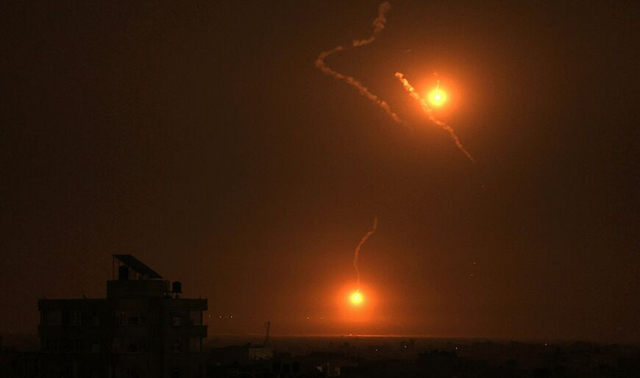
GAZA STRIP, Palestinian Territories, Oct 28, 2023 (BSS/AFP) - Battles were
raging in Gaza early on Saturday, as Israel expanded its ground operations
and cut communications to the Palestinian territory, three weeks after the
deadliest attack in the country's history.
The United Nations warned of a looming "unprecedented avalanche of human
suffering" inside the Gaza Strip, following weeks of relentless bombing by
Israel, while the General Assembly pushed for an "immediate humanitarian
truce".
"We are confronting an Israeli ground incursion in Beit Hanoun (in the
northern Gaza Strip) and east Bureij (in the centre) and violent engagements
are taking place on the ground," Hamas's armed wing the Ezzedine al-Qassam
Brigades said in a statement.
Israeli military spokesman Major Nir Dinar told AFP: "Our troops are
operating inside Gaza as they did yesterday."
With tens of thousands of troops massed along the Gaza border ahead of an
expected full-blown invasion, Israeli forces also made limited ground
incursions on Wednesday and Thursday nights.
"Following the series of strikes of the last days, the ground forces are
extending the ground operations tonight," military spokesman Daniel Hagari
told reporters Friday.
Israel's military also said it had increased its strikes "in a very
significant way", while the Ezzedine al-Qassam Brigades said on Telegram it
responded with "salvos of rockets".
- 'Why are they bombing us? -
AFP live footage late Friday showed air strike after air strike light up the
night sky of northern Gaza as thick black smoke clouded the horizon.
In a bombed-out street in the Tal al-Hawa neighbourhood, 50-year-old Om Walid
Basal asked why her apartment block had been bombed by Israel.
"This was our house, we lived here just with our children, it was full of
children," she said.
"Why are they bombing us? Why are they destroying our homes?"
Israel launched its bombardment of Gaza after Hamas gunmen stormed across the
border on October 7, killing 1,400 people, mostly civilians, and kidnapping
over 220 others, according to Israeli officials.
The Hamas-run health ministry said Friday that Israeli strikes on Gaza had
now killed 7,326 people, more than 3,000 of them children.
Hamas earlier said it was "ready" for an invasion.
"If (Prime Minister Benjamin) Netanyahu decides to enter Gaza tonight, the
resistance is ready," Ezzat al-Rishaq, a senior member of the Hamas political
bureau, said on Telegram.
"The remains of his soldiers will be swallowed up by the land of Gaza."
- Internet cut -
Hamas said all internet connections and communications across Gaza had been
cut, and accused Israel of taking the measure "to perpetrate massacres with
bloody retaliatory strikes from the air, land and sea".
Human Rights Watch also warned that the near-total telecommunications
blackout in Gaza risks providing cover for "mass atrocities".
The Palestinian Red Crescent meanwhile said ambulance services had been
disrupted.
"We have completely lost contact with the operations room in the Gaza Strip
and all our teams operating there," it said on X, formerly Twitter.
Lynne Hastings, the UN humanitarian coordinator for the occupied Palestinian
territory, also said on X that Gaza "has lost contact with the outside
world", cautioning that "hospitals & humanitarian operations can't continue
without communications".
- UN truce call -
The reports of ground fighting came after the UN General Assembly called on
Friday for an "immediate humanitarian truce" in Gaza.
The nonbinding resolution received overwhelming support and was welcomed by
Hamas.
But it was harshly criticised by Israel and the United States for failing to
mention Hamas, with Israeli ambassador Gilad Erdan calling it an "infamy".
Washington earlier said it supports a "humanitarian pause" so aid can get
into Gaza.
Israel's bombardment has displaced more than 1.4 million people inside the
crowded territory, even as supplies of food, water and power to Gaza have
been almost completely cut off.
And Israel has blocked all deliveries of fuel, saying it would be exploited
by Hamas to manufacture weapons and explosives.
UN Secretary-General Antonio Guterres warned that misery was "growing by the
minute".
"I repeat my call for a humanitarian ceasefire, the unconditional release of
all hostages, and the delivery of life-saving supplies," Guterres said in a
statement.
"Without a fundamental change, the people of Gaza will face an unprecedented
avalanche of human suffering."
Jordan's foreign minister warned on X that an Israeli ground invasion of Gaza
would spell a "catastrophe of epic proportions" for the territory for years
to come.
- 'Nothing more than crumbs' -
The UN agency for Palestinian refugees, UNRWA, has cautioned that "many more
will die" in Gaza from catastrophic shortages.
"People in Gaza are dying, they are not only dying from bombs and strikes,
soon many more will die from the consequences of (the) siege," said Philippe
Lazzarini, chief of the UN agency for Palestinian refugees (UNRWA).
A first tranche of critically needed aid was allowed in last weekend, but
only 74 trucks have crossed since then. The UN says an average of 500 trucks
entered Gaza every day before the conflict.
"These few trucks are nothing more than crumbs that will not make a
difference," Lazzarini said.
A first team of six medics from the International Committee of the Red Cross
entered Gaza Friday via its Rafah crossing with Egypt, along with six aid
trucks, the ICRC said.
Between the bombardments and the fuel shortages, 12 of Gaza's 35 hospitals
have been forced to close, and UNRWA said it has had to "significantly reduce
its operations".
Israel's military accused Hamas of using hospitals in Gaza as operations
centres for directing attacks, an allegation Hamas swiftly denied.
Violence has also risen sharply in the occupied West Bank since the October 7
attacks, with more than 100 Palestinians killed and over 1,900 wounded.